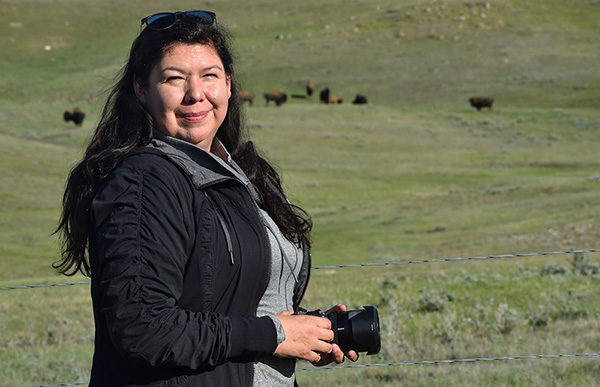Singing Back the Buffalo
by Staff Editors
(June 20, 2022 – Edmonton, AB) In order to reconnect to the territory and to acknowledge the special relationship held between women and the buffalo, five Indigenous women, Cree and Blackfoot, hiked into the backcountry of Banff National Park earlier this month to visit a small buffalo herd that was re-introduced to the area in 2017. Accompanied by an Indigenous women crew, the hike has been filmed for Tasha Hubbard’s forthcoming feature documentary, Singing Back the Buffalo.
Award-winning Cree filmmaker Tasha Hubbard’s (nîpawistamâsowin: We Will Stand Up, Birth of a Family) feature length Singing Back the Buffalo follows Indigenous visionaries, scientists and communities who are rematriating the buffalo to the heart of the North American plains they once defined, signaling a turning point for Indigenous nations, the ecosystem, and all of our collective survival.
Singing Back the Buffalo is written and directed by Hubbard and produced by Jason Ryle (Amplify), George Hupka (nîpawistamâsowin: We Will Stand Up, Obmin, On The Edge), associate produced by Marie-Eve Marchand (Iniskim), and executive produced by Bonnie Thompson (The Secret Society, nîpawistamâsowin: We Will Stand Up). A one-hour version will be broadcast on CBC The Nature of Things, and the feature version on APTN. The film will have its festival launch in 2024.

As a girl growing up on the prairies in Saskatchewan, Hubbard would imagine herds of buffalo roaming vast open plains on which she lived. 165 years ago, it was common for big herds to stretch out as far as the eye could see and take two days to pass by. Three decades later, after massive campaigns of deliberate slaughter, there were as little as 250 buffalo left from the over 50 million that moved across the continent. The impact on Indigenous plains nations, who had depended on the buffalo for food, shelter, and spiritual sustenance, was disastrous. The buffalo’s fate forced Indigenous Peoples, now starving, into confinement on the reserves. For over a century, neither have been free to walk the lands for which Indigenous Peoples have cared for millennia.
Hubbard is now an award-winning filmmaker, a buffalo academic and buffalo activist. With Singing Back the Buffalo she takes viewers on an epic journey that has not yet been told on screen, exploring concepts of buffalo consciousness, buffalo personhood, and relationships between buffalo and Indigenous Peoples. From her Indigenous point of view, we learn the importance of rematriating teachings from the buffalo, and how the land needs the buffalo back more than ever in this time of climate change, food insecurity, and uncertainty. We meet Indigenous visionaries, leaders, scientists, and communities who are restoring the buffalo to the land they once defined. Their return back across the heart of North America signals a turning point for the long-term collective survival of Indigenous nations, the environment and all of humanity.
“The buffalo are moving into the public consciousness, but what has been missing is the full picture of what they mean to us as Indigenous Peoples. As a feature filmmaker who has been learning about and connecting to the buffalo for years for my academic career, this film marks the intersection of my two worlds. I have been dreaming about the possibilities for the restoration of the large herds of buffalo for decades, and this film will follow my journey as I meet with Indigenous Peoples who share a similar dream,” said Hubbard.
Singing Back the Buffalo is a CBC original production, produced in association with APTN and produced with the participation of the Canada Media Fund, the Indigenous Screen Office and Telefilm Canada, with the assistance of the Government of Alberta, the participation of the Canadian Film or Video Production Tax Credit and Rogers Documentary Fund. Fiscal sponsorship provided by Redford Center. Theatrical distribution by Isuma Distribution International.
SOURCE: Roundstone Communications


